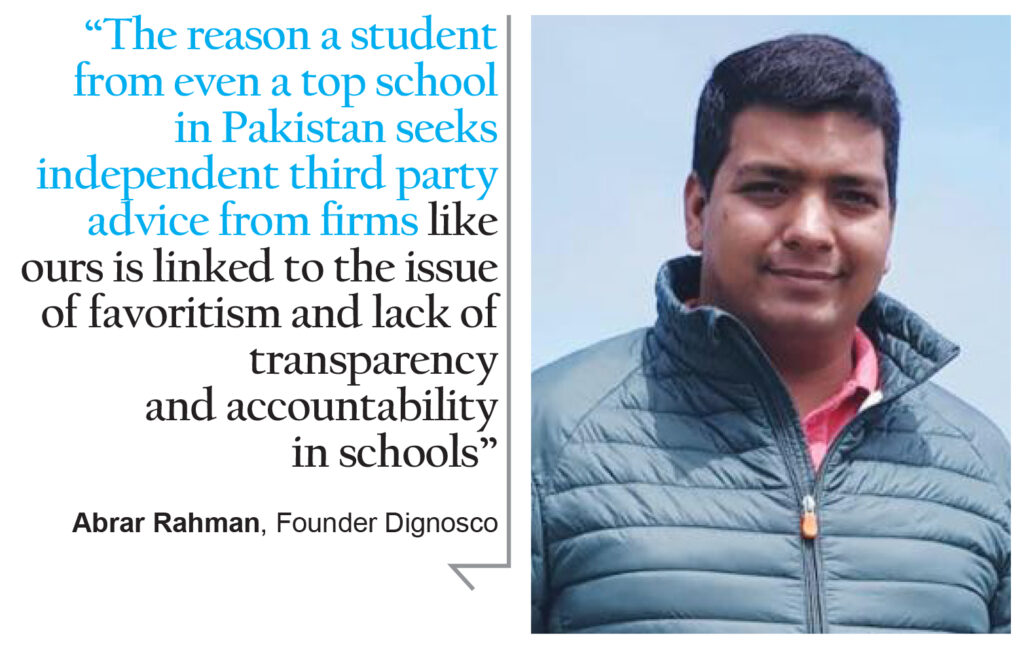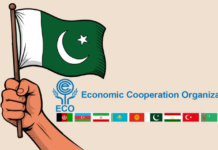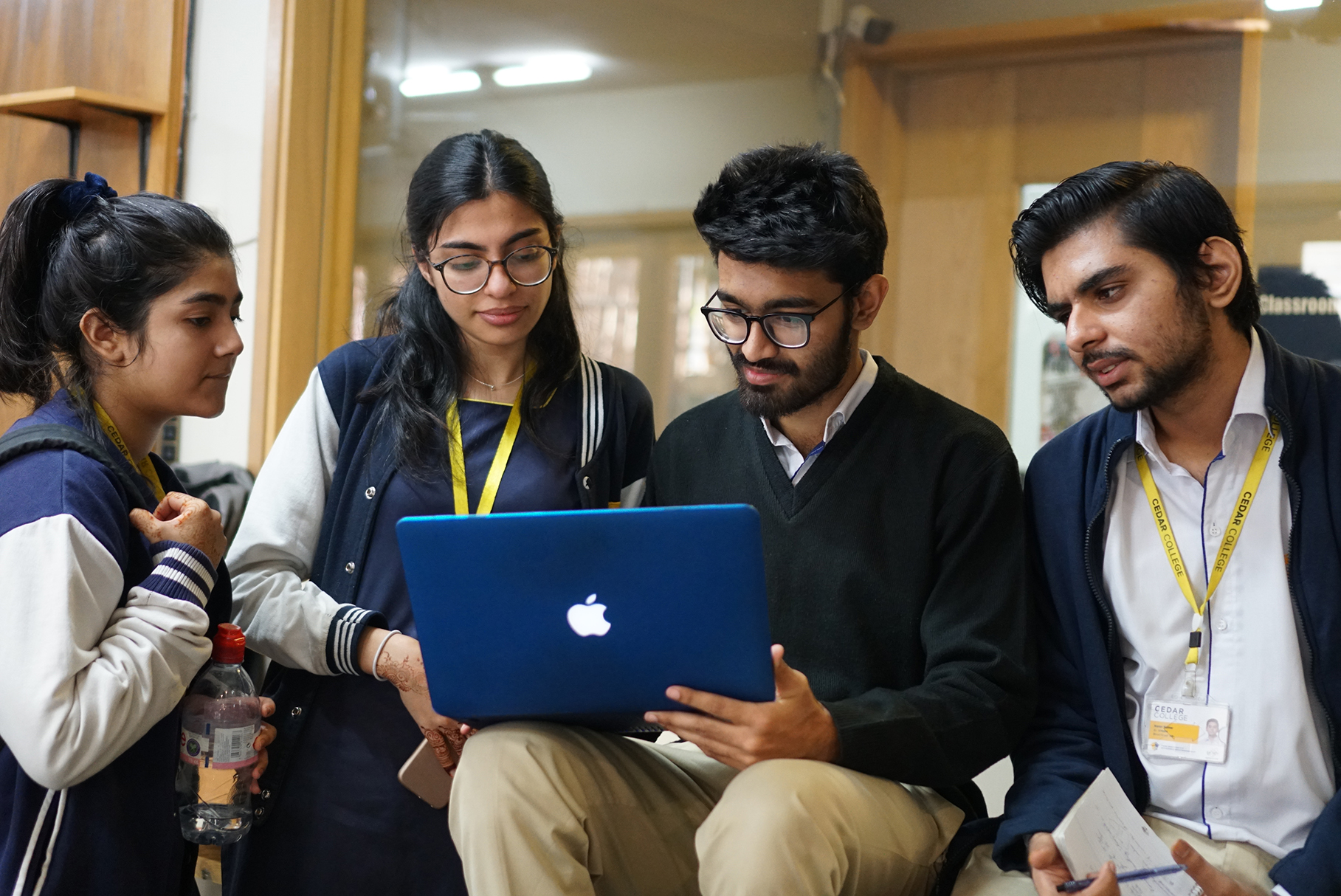Let’s think of two scenarios. In the first one, you’re rich. Scratch that, you’re filthy rich. Your kid is a middling student at Aitchison, or LGS, or American Lyceum or Lycetuff or something – one of those schools with the huge campuses and fancy A level programmes that promise to give you the world in exchange for a whole lot of money.
Your kid wants to go to America,or the UK, anywhere but Pakistan for that matter – and you want to oblige, because college is important, and you want what’s best for your son or daughter. They aren’t getting into Harvard or Oxbridge, they made sure of that with their grades, but you can send them to one of the smaller universities. Not as famous or prestigious, but still leagues ahead of anything in Pakistan – and of course, the label of a foreign education counts for much in Pakistan.
You can easily afford the tuition of course, even if the dollar is over 160 rupees. What you can’t do for them are the tricky parts of the admission process: writing a college essay, filling up their supplementary essays, giving them a personality, and crafting a story that someone in admissions will look at and think, yes, this candidate would fit.
What do you do?
In the second scenario, you’re not so rich. In fact, you’re struggling every day to maintain a certain kind of life. Your kids have been put through the entire O level gambit, but from one of the lower tier schools – and even there you’re scratching and clawing to keep up with their fees and the costs of their books.
But you’ve got one hope. One of your sons or daughters is brilliant. They’ve got flying grades in their O levels, and they managed to get a scholarship to one of the big schools. Their grades are up and they’re bringing home debates trophies like flyers.
Your kid comes up to you, a little reluctant, but still they do. They want to attend university abroad. They’ll be applying for aid or hunting for scholarships of course, but even doing that is going to cost money. Not to mention, asking for financial help means all kinds of complexities that come with the foreign admissions process. But you want the best for your kids.
What do you do?
The answer to both scenarios is the same, you go to Dignosco, an all purpose academic consultancy firm that has made the foreign admissions cycle its business. Providing a range of services that cost anywhere between Rs 2,000 and Rs 1.5 million, Dignosco has been operating for a decade. And since its founding in 2009, it has established itself as the go to academic counseling service in Lahore, and developed a formidable business model. Besides Lahore, the firm operates in Karachi as well as Islamabad.
The best thing about Dignosco, on the surface at least, is that it is accessible for people in both scenarios. Anyone can get a meeting, they have different levels of service, and most importantly, they offer subsidised rates for students with strong academic credentials who can demonstrate genuine financial need. While the competition for these slots is fierce, there is always an opening for the best of the best.

But what exactly is it that Dignosco does? What are these services that they provide, and what do the different levels of services mean? More importantly, how true is the impression that professional college counselling is dirty and cuts corners in exchange for money?
Dignosco is hands down the most reputable college counselling service out there. It has, within groups and behind closed doors, been accused of dubious tactics to try and improve chances for admissions. Their response has been that they aren’t dirty, but the schools you’re sending your children to are the ones actually cutting corners.
Profit, takes a look.
The moneyed and the not so moneyed
The class difference is palpable, of course. The concept of privilege should not be lightly thrown around in a business and economics magazine, but it is an uncomfortable reality that comes to mind when you think of Dignosco. Going to a foreign university is already a rigged game from birth, where years of elite, expensive education plays the main role. An expensive counselling service like Dignosco means the process becomes even easier than it already is for people with money.
Dignosco, however, answers this with their claim that they are ‘need blind’, which would mean that if a candidate had outstanding academics but also had money, they would still have to pay in full. But if a candidate had those kind of grades but no money, they would be subsidised by the first person.
While the opportunities are harder to get and few and far in between, they are still there, and are good for Dignosco as well. Because the more successful candidates they take in, the more they can advertise on facebook. And having too many losing candidates, no matter how much money they bring in, is never a good idea for the future.
Perhaps the greatest response to such queries is that while Dignosco may do everything and make a student’s life easier, they can’t sit their exams for them or ensure a high standardised test scores. Those things a student, with or without money, will have to ensure themselves. But it still holds true that it is a quicker way to do things, and that is why people are willing to fork over the cash.
“This suggests that students who come from affluent backgrounds are not bright students, which in my experience is very far from reality,” says Abrar Rahman, the founder and director of Dignosco.
“Most of the students who go abroad to top end colleges from Pakistan are very bright regardless of whether they are paying the full fee of a college or have received a scholarship” he goes on to say.
And as Abrar explains further, one must look at it as an investment. He gives the example of a girl they helped, who went on to study at Trinity College in the US and she just had to pay $200 a year and the rest of the cost of tuition and living was covered by the university. For four years of undergraduate programme at the university, that is less than a $1,000 she would pay for her entire programme, which would otherwise cost $200,000-$400,000.
This sounds like a win win situation. Where you pay Dignosco, and they make things happen which will save you money because you will get aid or a scholarship. Yet they are quick to point out that admission can never be guaranteed, and they can only hope along with you. In which case, it is a risky investment that could very quickly go down the drain.
What in the world do they do?
Getting admitted to a foreign university is a surprisingly complicated process. For starters, there are all the different kinds of essays and personal statements you have to right. Forms you have to fill, recommendations you have to collect and if you’re applying for financial aid, all of the proofs of poverty you have to com bearing. And the most important factor that brings Dignosco most of its business is a lack of understanding.
When you walk into their offices as a student looking for help, the first step is always the initial meeting with one of the counselors. This walk in meeting can cost Rs 2000, but from then onwards, the client can choose what kind of service they’re looking at for affordability.
The agency is hot mostly among A level students, who are trying to get into foreign undergraduate programmes. But contrary to popular belief, Dignosco caters to all kinds of foreign applications, and takes in students from a very young age, and even deals with much older candidates looking to pursue higher level degrees.
“We target students from grade 6 onwards and cater to individuals till about 45 years of age. Advice mostly focuses on academic and extracurricular activities” Abrar Rahman tells us. A Yale graduate, Abrar founded Dignosco after spending a few years bouncing around as a counselor for different schools.
Having gone through the grueling process of applying to an Ivy league and getting in with a scholarship, that too figuring it out himself along the way, Abrar knew that there was a market for people looking for guidance.
“The biggest factors are that there are inherent, deeply rooted defects in Pakistan’s education system – even the private education sector. The second issue is of awareness. People simply don’t know the options they have, and that’s where we come in” he says.
“We hire a team of people experience with the admission processes in the US and the UK and the Middle East and other places. We bridge the gap.”
“Our job is to ensure an individual’s personal development as well as research and discussion on global higher education opportunities available to them, and what an individual is required to do for competitive admission at these universities. We deal with undergraduate, graduate, and MBA applicants and younger students for their personal development,” he explains.
“Within Pakistan’s educational institutions, only a few schools have dedicated full time college counselors so information is hard to come by.”
So in theory, a student confused about his options could come and have them cleared up by the Dignosco team. If the student feels overwhelmed, he can pay them and receive services such as advice, guidance and general help. If the student still feels like they can’t keep up, they can simply ask for more help. This might involve assistance on college essays, provision of internship opportunities and other such services. The possibilities are endless.
How much is too much?
Of course, while the concept of guidance is something no one can possibly hold against anyone, there remains the question of how much of an application is the student’s doing and how much is the person counselling them responsible for it.
Dignosco’s biggest money maker is naturally the A level market. To apply to the US for an undergraduate degree, you have to go through the common application process – a uniform application form that all universities in the US use. The sister to this in the UK is the UCAS. Both of these require personal statements, and supplements written for each specific college so the candidate can show their aptitude for the particular place they are applying to.
This is where the murky bit comes in. For student testimonies and people working for Dignosco for some time admit that the staff at Dignosco often write essays and supplements from scratch, and thus provide less than truthful information to colleges. While it would be understandable for Dignosco to be a guiding hand, one that nudges and prods and suggests, often times in applications, it is impossible to tell where the student begins and the agency ends.
Other things include engineering internships, by which Dignosco often hires the people paying them as interns so they have something to put on their resumes. Brighter students, usually the ones that have battled their way through the financial aid screening, are often found writing for other students – ones who pay in full.
Another fascinating cash cow for the agency have been their trips. They arrange trekking and scuba diving trips for their customers, for which they charge them in lakhs, which are much higher prices than normal, and take them on these excursions so they then have something exciting to write about in their applications.
What foreign universities want is personality. And if you’re looking for financial aid, then you better be bringing some serious diversity points to the table. So that is what Dignosco does, they create diversity and experiences in exchange for money.
No one can begrudge a company for making money. Nothing that Dignosco is doing is illegal. In fact, as we will see later in this piece, they are more trustworthy than many other counselling services. Whether their patterns of behaviour are right or wrong, moral or immoral, ethical or unethical, that is for the conscientious consumer to decide.
In his response to our questions regarding the possibility of their services being morally dubious, Abrar responded with a passion. For starters, he completely denied the writing of essays from scratch, which is one of the main complaints in the testimonies. To the matter of engineering internships, Abrar finds nothing strange about it, which is fair enough. Even the trips make sense, especially if someone can pay for them.
“These testimonies reflect the narrative promoted by certain schools that actively discourage their students from seeking advice from Dignosco as we openly question the unfair practices at these schools” Abrar Rahman tells us in an email.
This is where the beef really is – in the competition. You see, Dignosco doesn’t like the A levels schools that most of its clientele goes to. And the schools, well, let’s just say there’s no love lost between them and Dignosco.
The competition
Dignosco is at war with the schools. And when we say the schools – we mean those fancy A level places. We mean the pompous elite airs of Aitchison college, the scrappy up and comers of LGS JT and everything in between.
You see, when a student gets ad
mitted to a good university, the school wants to plaster their face on billboards and stake their flag in the student. They are a prize to be shown off – proof that the school works. But if the student has been going to a place like Dignosco, the credit will be divided.
That is essentially why the schools don’t like Dignosco. Because they take their students and make them their own. But for Dignosco, they are simply doing what the schools cannot do. And moreover, not only do they deny unethical practices themselves, they level similar allegations against these schools.
“The reason a student from even a top school in Pakistan seeks independent third party advice from firms like ours is linked to the issue of favoritism and lack of transparency and accountability in schools” says Abrar Rahman.
This is where Dignosco has an edge. Where a handful of people would provide counselling to large batches of students at school, Dignosco can provide more one on one attention to each student.
“Firms like ours give students and parents different perspectives to think about and logically evaluate the advice they have been given in school to make an informed decision,” he says.
And in addition to being better at and having more counselling resources than the schools, Abrar Rahman claims that the schools are the ones that are crooked, not his firm. And he doesn’t hold back from naming names – Aitchison, LGS JT, KGS and the likes, he seems to have dirt on all of them.
“There have been instances where reputed universities like Harvard and Yale have written letters to schools in Pakistan, such as Lahore Grammar School Johar Town Branch, asking them to explain why their internal record of a student’s academic performance and the grades they predict a student to achieve in their external examinations do not correlate with the student’s actual performance in external A Level examinations” he adds regarding the famed LGS JT boys branch.
He also relates how the Aithichison admin actually took the battle between counselling firms and schools and issued circulars to their students, warning repercussions if they took Dignosco’s services.
“The last comment about Dignosco arranging “trekking and scuba diving trips for their customers, for which they charge them in lakhs, which are much higher prices than normal” reminds me of a letter sent by Aitchison College on August 21st, 2015 to the parents of all the students enrolled at Aitchison College at the time” he says in his email to us.
“This letter accused private counsellors of unethical practices, similar to the allegations highlighted in the testimonies you shared, and criticised the remunerations of such private counsellors. To give you an idea of the kind of hostility Dignosco faces from schools such as Aitchison College I will share an extract from this letter that specified that students working with private counsellors “will not be allowed to apply for financial aid to different universities, the school will not be processing their documents, they will not be allowed to get teachers’ recommendations from the school and the admission counsellor will not be writing their school reports or recommendations.”
Abrar Rahman’s elaborate response was an indictment of the corners that are cut by large, private schools in such a process. However, they were not a defense of the practices that take place at his firm.
While he has denied Dignosco writing essays from scratch, he does say that colleges expect students to be helped in their personal statement process by their family, friends, and indeed, teachers. Again, it is important to remember that whatever Dignosco does is perfectly legitimate business, and the schools inserting disallowing their students from going to them through threats are in the wrong. But at the same time, the business that Dignosco is in, is one that will always be dubious and hard to digest.
The larger world of academic counselling
How education consultancy businesses operate is that they will counsel students to secure admissions at partner or non-partner universities. Under the partnership model, the counsellors would acts as agents for foreign universities they are partners with against a percentage driven commission paid by the partner university based on the number of kids they send to a particular university or college.
Non-partner universities are the top ones in the world such as Stanford University, UC Berkeley or Ivy League universities in America, and Oxford or Cambridge in the UK. These universities do not need partners because of a very high global demand of these universities among students, which makes the process of getting into these universities highly competitive. Only the right sort of application would get a student into the top-tier universities across the globe and that is what counsellors help a student build and charge for their service.
“Different universities appoint agents across the globe to help with international student recruitment. This practice originated in the UK and has now been adopted by a lot of colleges in Canada, Australia, Turkey, Malaysia, and even in the US. Normally the agent gets a percentage driven commission based on the number of kids they send to a particular university or college,” says Abrar Rahman.
Why foreign universities appoint partners is because globally, most countries have tried to attract international students to their universities not only to attract talent but also to stimulate the economy by getting an influx of funds from other countries in the form of tuition costs and living expenses of international students.
“It is in this background that some countries promote the agency models in third world countries to recruit international students,” he adds.
According to International Consultants for Education and Fairs (ICEF), a German market intelligence firm dedicated to the international education industry, Pakistan sent nearly 40,000 students abroad for higher education in 2013. The number has only swelled and estimates now put the number of Pakistani students going to foreign universities each year to be roughly 50,000 or more at present.
Assuming that 40,000 students go abroad each year from Pakistan to study in different countries, and assuming that the cost of studying abroad would on average be $30,000 per student per annum, it comes out to a conservative estimate of $1.2 billion spent by Pakistani students on foreign education. That is the sum that flows out of a ‘third world’ country like Pakistan and gets injected into ‘developed’ economies, simply because Pakistani universities aren’t perceived to be good enough in comparison with foreign universities.
Dignosco does not operate in the local admissions space but does provide guidance about local universities to students working with them for foreign admissions.
“We don’t deal with students who are just targeting local universities. People who apply abroad also apply to local universities as a backup and in some cases, they decide to stay in Pakistan. So we have such cases but we don’t cater to students who are just applying in Pakistan,” he says.
Abrar tells Profit that Dignosco operates in an advisory capacity and the business is mostly focused on the non-partner segment, but they also entered the partnerships segment only a few years back.
But at the same time, where Dignosco has managed to establish a name for itself and for its services, there are others out there trying to ride the wave and make a quick buck along the way. In fact, there are numerous firms and individuals operating in this space unregistered, with all the incentive to scam a student with the lure of sending him abroad.
In such a space, Dignosco does provide a professional environment. They have also created a fascinating business model for their venture. Despite all this, there remains a feeling of discomfort surrounding their activities. Perhaps it is the uncomfortable realisation that those with money have it much easier than those that don’t in some ridiculous ways. But all around the world such services exist. For a similar service consultants in UAE charge an average of $25,000 and in China firms charge up to $60,000 according to Abrar.
Or maybe it’s the thought of their methods to get admissions not being fair. What they have done for sure is make college counselling a profitable business, and create a demand for it that is bound to breed further supply. And perhaps serious competition might sober up Dignosco’s worse impulses as well.
(With additional reporting and editing by Abdullah Niazi)





















I would have an easier time believing that Dignosco is indeed the shining beacon of service delivery, ethical practices and transparency personified that their founder/director claims it to be, if only those claims were accompanied by itemized financial statements of the company from years past.
Comments are closed.